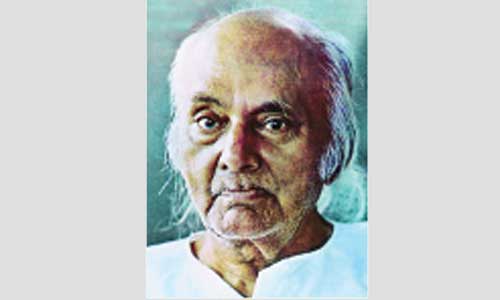Nazrul’s 117th birth anniv today
The 117th anniversary of birth of the national poet, Kazi Nazrul Islam, will be observed today.
A polymath, poet, lyricist, composer, playwright, novelist, revolutionary and journalist Nazrul sang for freedom and love equally. He took up his pen against colonial rule, oppression and exploitation. He is widely known as rebel poet.
Nazrul’s poetry and music espoused renaissance and intense rebellion against colonial rule and oppression. Nazrul is known for his impassioned writings for political and social justice.
Programmes marking the day would begin with placing wreaths at the poet’s grave on Dhaka University Central Mosque premises in the morning.
A national level programme, organised by cultural affairs ministry, will be held at MA Aziz Stadium in Chittagong this morning.
Patronised by the ministry, all district administrations will also organise special programmes marking the day.
Besides the government, different socio-cultural organisations have taken elaborate programmes.
Nazrul Institute will organise an exhibition portraying portraits and manuscripts of the poet at the Bangladesh National Museum.
Nazrul Academy has organised a four-day Nazrul birth anniversary celebrations programme at the Music and Dance Centre of Bangladesh Shilpakala Academy.
Shilpakala Academy and Bangla Academy have also organised separate programmes.
Bangladesh Betar, Bangladesh Television and private television channels and radio stations will air special programmes, highlighting Nazrul’s life and work.
On the occasion, president Abdul Hamid, prime minister Sheikh Hasina and Bangladesh Nationalist Party chairperson Khaleda Zia in separate statements conveyed their honour to the poet and prayed for his departed soul.
Nazrul was born at Churulia village in Bardhawan in West Bengal in 1899.
Nazrul’s anniversary of birth is observed in Bangladesh on Jaishtha 11 in Bangla calendar.
Nazrul and his family members were brought to Dhaka from Kolkata with the state honour in May 1972. The poet also spent many days of his boyhood and youth at places in Bangladesh and created some evergreen poems, songs and essays.
In his short artistic career of just 21 years, before he lost his speech, Nazrul penned 3,174 songs, 600 poems, three novels and 43 essays, according to Nazrul Institute.
Nazrul led an ordinary but eventful life. His talent, honed through years of dedication and determination despite continued challenges, triggered him to write poems, songs, novels and plays that stood the test of time. His poems were inspired by themes of love, revolt and a deep compassion for common people.
At the age of nine, he had to join a Churulia-based professional leto troupe to earn his living. While working for the troupe, he was introduced to Bangla and Sanskrit literature. A year later, he resumed education and got enrolled at Matharun English School but dropped out at Class-VI for poverty.
Subsequently, he worked with a Kabi Gaan troupe and also took up a job at a bakery shop. At this stage, Nazrul started writing poems and his talent soon grabbed the attention of police officer Kazi Rafizullah, who gave him shelter at his house at Trishal in Mymensingh in 1914 and got him enrolled in Class-VII at Darirampur School.
Nazrul joined British Army in 1917 as a soldier. While serving the army for two years and a half, he was introduced to Persian literature and learned to play different instruments and music following notation.
After the abolishment of 49 Bengal Regiment by British Army in 1920, Nazrul dedicated himself to writing of revolutionary poems, essays.
He started a fortnightly magazine, Dhumketu, in August 1922.
For his political poem Anandamayeer Agamane, Nazrul was sentenced imprisonment for one year. While in prison, the poet wrote his masterpieces Aj Srishti Sukher Ullase, Abhishap, Jater Namey Bajjati, Bhangar Gaan and Shikal Para Chhal.
In his creative life, Nazrul also worked as a music composer for popular music brand HMV.
News Courtesy: www.newagebd.net











